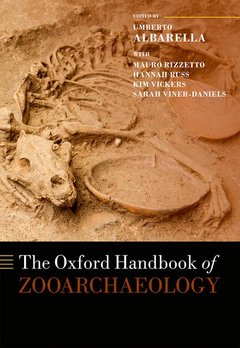Description
The Oxford Handbook of Zooarchaeology
Oxford Handbooks Series
Coordinators: Albarella Umberto, Rizzetto Mauro, Russ Hannah, Vickers Kim, Viner-Daniels Sarah
Language: English
Subjects for The Oxford Handbook of Zooarchaeology:
Publication date: 03-2017
866 p. · 18.6x25.3 cm · Hardback
866 p. · 18.6x25.3 cm · Hardback
Description
/li>Biography
/li>
Animals have played a fundamental role in shaping human history, and the study of their remains from archaeological sites - zooarchaeology - has gradually been emerging as a powerful discipline and crucible for forging an understanding of our past. The Oxford Handbook of Zooarchaeology offers a cutting-edge compendium of zooarchaeology the world over that transcends environmental, economic, and social approaches, seeking instead to provide a holistic view of the roles played by animals in past human cultures. Incisive chapters written by leading scholars in the field incorporate case studies from across five continents, from Iceland to New Zealand and from Japan to Egypt and Ecuador, providing a sense of the dynamism of the discipline, the many approaches and methods adopted by different schools and traditions, and an idea of the huge range of interactions that have occurred between people and animals throughout the world and its history. Adaptations of human-animal relationships in environments as varied as the Arctic, temperate forests, deserts, the tropics, and the sea are discussed, while studies of hunter-gatherers, farmers, herders, fishermen, and even traders and urban dwellers highlight the importance that animals have had in all forms of human societies. With an introduction that clearly contextualizes the current practice of zooarchaeology in relation to both its history and the challenges and opportunities that can be expected for the future, and a methodological glossary illuminating the way in which zooarchaeologists approach the study of their material, this Handbook will be invaluable not only for specialists in the field, but for anybody who has an interest in our past and the role that animals have played in forging it.
Umberto Albarella is a Reader in Zooarchaeology at the University of Sheffield. He obtained his PhD from the University of Durham, having first become interested in anthropology and then archaeology as an undergraduate student, and worked at the Universities of Lecce, Birmingham, and Durham before moving to the University of Sheffield in 2004. Specializing in the study of animal bones from archaeological sites, his main areas of research are wide-ranging and include animal domestication and husbandry intensification, ethnoarchaeology, the ritual use of animals, husbandry evidence of Romanization, animals and medieval life, integration in archaeology, and archaeology and politics. He is widely published in these fields and has previously served as Secretary of the International Council of Archaeozoology (ICAZ) from 2006 until 2012. Mauro Rizzetto is a PhD student at the University of Sheffield whose research concerns the development of animal husbandry during the late Roman to early medieval transition in Britain and the lower Rhine region, with particular regard to biometrical changes. He has also been working at a number of archaeological sites in Italy, Britain, France, Greece, and Spain, dating from the Neolithic to the post-medieval period. He previously obtained an undergraduate degree in Archaeological Science in 2013 and a Master's degree in Osteoarchaeology in 2015, both at the University of Sheffield. Hannah Russ is a Post-Excavation Manager at Northern Archaeological Associates and an Honorary Research fellow at the Universities of Sheffield and Wales, Trinity Saint David. She is a zooarchaeologist specializing in the study of aquatic animals, including fish, molluscs, and crustaceans, and has worked on remains from five UNESCO World Heritage sites, as well as other sites in Western Europe and the Middle East dating from the Upper Palaeolithic through to the post-medieval period. Hannah completed her PhD in Archaeological Sciences in 2011 at the Universit
© 2024 LAVOISIER S.A.S.



